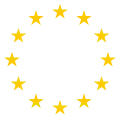Berlin Process
The Berlin Process is a diplomatic initiative linked to the future enlargement of the European Union. It started with the 2014 Berlin Conference, which was followed by the 2015 Vienna Summit, the 2016 Paris Summit, the 2017 Trieste Summit and the 2018 London Summit. The Berlin Process was initiated in order to consolidate and maintain the dynamics of the EU integration process in light of increased euroscepticism and the five-year moratorium on enlargement announced by Commission President Jean Claude Juncker.[1]
.svg.png.webp) | |
| Formation | August 28, 2014 |
|---|---|
Membership |
|
| Website | https://berlinprocess.info/ |
The Berlin Process is an intergovernmental cooperation initiative aimed at revitalizing the multilateral ties between the Western Balkans and selected EU member states, and at improving regional cooperation in the Western Balkans on the issues of infrastructure and economic development.[2] It is one of the flagship diplomatic initiatives on South-east Europe of the third Merkel cabinet. It is complemented by initiatives relating to specific South-east European countries (e.g., the German-British diplomatic initiative for Bosnia and Herzegovina's EU accession).
The initiative includes six Western Balkan countries that are candidates for EU membership (Montenegro, Serbia, North Macedonia, Albania) or potential candidates (Bosnia and Herzegovina, Kosovo[lower-alpha 1]), some EU members, i.e.: Austria, Bulgaria, Croatia, France, Greece, Germany, Italy, Poland, and Slovenia[2] and one third country, the United Kingdom.
The 2020 presidency is jointly held by Bulgaria and North Macedonia.
See also
- 2014 Conference of Western Balkan States, Berlin
- 2015 Western Balkans Summit, Vienna
- 2016 Western Balkans Summit, Paris
- 2017 Western Balkans Summit, Trieste
- 2018 Western Balkans Summit, London
- 2019 Western Balkans Summit, Poznań
- Future enlargement of the European Union
- Belgrade–Pristina negotiations
- Southeast Europe Transport Community
Notes
- Kosovo is the subject of a territorial dispute between the Republic of Kosovo and the Republic of Serbia. The Republic of Kosovo unilaterally declared independence on 17 February 2008. Serbia continues to claim it as part of its own sovereign territory. The two governments began to normalise relations in 2013, as part of the 2013 Brussels Agreement. Kosovo is currently recognized as an independent state by 98 out of the 193 United Nations member states. In total, 113 UN member states recognized Kosovo at some point, of which 15 later withdrew their recognition.
References
- ShtetiWeb. "THE BERLIN PROCESS". Archived from the original on July 28, 2015. Retrieved May 26, 2014.
- "A new logo for Western Balkans Summit in Poznan". Ministry of Foreign Affairs Republic of Poland. 2019-02-27. Retrieved 2019-03-05.
